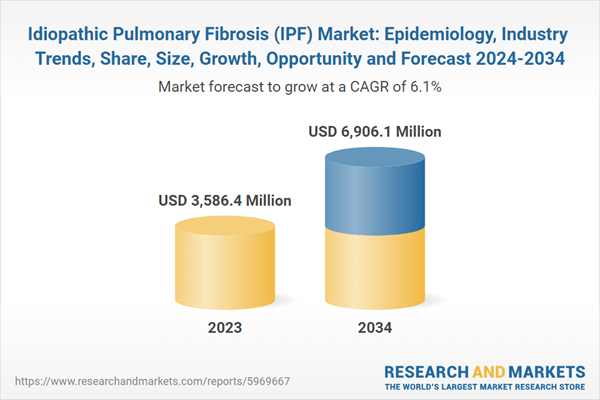Idiopathic Pulmonary Fibrosis (IPF) market is currently driven by factors such as a rising geriatric population, cigarette smoking, a strong drug pipeline that have a good efficacy and safety profile and improving diagnosis and drug treatment rates. Idiopathic Pulmonary Fibrosis represents the most common of the idiopathic interstitial pneumonias and is characterized by a chronic, progressive, fibrotic interstitial lung disease having an unknown cause. This disease rarely occurs before the age of 50 years and primarily affects older adults (60+). With the geriatric population expected to increase considerably over the long term, we expect the incidence of Idiopathic Pulmonary Fibrosis to increase significantly over the next few years.
In patients with IPF, the tiny air sacs in the lungs (alveoli) get damaged and increasingly scarred. This results in the lungs becoming stiff that makes it hard for oxygen to get into the blood. The causes of IPF are unknown, but various risk factors have been identified, this includes older age, cigarette smoking, environmental exposures, certain infections, etc. Cigarette smoking, particularly involving more than 20 pack-years, represents the most strongly associated environmental risk factor. Furthermore, heightened risk for IPF has been associated with various environmental exposures (metal dusts, automobile emissions, and wood dust). Occupations such as agriculture and managing livestock have also been associated with IPF. There is a high unmet need for novel therapies to treat IPF as conventional drugs has limited efficacy or an unfavorable safety profile.
This report "Idiopathic Pulmonary Fibrosis Market: Epidemiology, Industry Trends, Share, Size, Growth, Opportunity, and Forecast" provides an exhaustive analysis of the Idiopathic Pulmonary Fibrosis market in the United States, EU5 (Germany, Spain, Italy, France, and United Kingdom) and Japan. The report provides an in-depth understanding of the current and future landscape of the Idiopathic Pulmonary Fibrosis market. This includes treatment practices, in-market, and pipeline drugs, the share of individual therapies, market performance across the seven major markets, market performance of key companies and their drugs, etc. The report also provides the current and future patient pool for Idiopathic Pulmonary Fibrosis across the seven major markets. According to the report, among the seven major markets, the United States has the largest patient pool for Idiopathic Pulmonary Fibrosis and represents the largest market for Idiopathic Pulmonary Fibrosis treatment. Furthermore, the current Idiopathic Pulmonary Fibrosis treatment practice/algorithm, market drivers, challenges, opportunities, reimbursement scenario, unmet medical needs, etc. have also been provided in the report. This report is a must-read for manufacturers, investors, business strategists, researchers, consultants, and all those who have any kind of stake or are planning to foray into the Idiopathic Pulmonary Fibrosis market in any manner.
Time Period of the Study
- Base Year: 2023
- Historical Period: 2018-2023
- Market Forecast: 2024-2034
Countries Covered
- United States
- Germany
- France
- United Kingdom
- Italy
- Spain
- Japan
Analysis Covered Across Each Country
- Historical, Current, and Future Epidemiology Scenario
- Historical, Current, and Future Performance of the Idiopathic Pulmonary Fibrosis Market
- Historical, Current, and Future Performance of Various Therapeutic Categories in the Idiopathic Pulmonary Fibrosis Market
- Sales of Various Drugs Across the Idiopathic Pulmonary Fibrosis Market
Competitive Landscape:
This report also provides a detailed analysis of the current Idiopathic Pulmonary Fibrosis marketed drugs and late-stage pipeline drugs.In-Market Drugs
- Drug Overview
- Mechanism of Action
- Regulatory Status
- Clinical Trial Results
- Drug Uptake and Market Performance
Late-Stage Pipeline Drugs
- Drug Overview
- Mechanism of Action
- Regulatory Status
- Clinical Trial Results
- Drug Uptake and Market Performance
Key Questions Answered in this Report:
Market Insights
- How has the Idiopathic Pulmonary Fibrosis market performed so far and how will it perform in the coming years?
- What are the markets shares of various therapeutic segments in 2023 and how are they expected to be in 2034?
- What was the country-wise size of the Idiopathic Pulmonary Fibrosis market across the seven major markets in 2023 and what will it look like in 2034?
- What is the growth rate of the Idiopathic Pulmonary Fibrosis market across the seven major markets and what will be the expected growth over the next ten years?
- What are the key unmet needs in the Idiopathic Pulmonary Fibrosis market?
Epidemiology Insights
- What is the size of the Idiopathic Pulmonary Fibrosis patient pool (2018-2023) across the seven major markets?
- What would be the forecasted patient pool (2024-2034) of Idiopathic Pulmonary Fibrosis across the seven major markets?
- What are the key factors driving the epidemiological trend of Idiopathic Pulmonary Fibrosis?
- What will be the growth rate of Idiopathic Pulmonary Fibrosis patients across the seven major markets?
Current Treatment Scenario, Marketed Drugs, and Emerging Therapies
- What are the current marketed Idiopathic Pulmonary Fibrosis drugs and what are their market performance?
- What are the key pipeline Idiopathic Pulmonary Fibrosis drugs and how are they expected to perform in the coming years?
- How safe are the currently marketed Idiopathic Pulmonary Fibrosis drugs and what are their efficacies?
- How safe are the late-stage pipeline Idiopathic Pulmonary Fibrosis drugs and what are their efficacies?
- What are the current treatment guidelines for Idiopathic Pulmonary Fibrosis drugs across the seven major markets?
- Who are the key companies in the Idiopathic Pulmonary Fibrosis market and what are their market shares?
- What are the key mergers and acquisitions, licensing activities, collaborations, etc. related to the Idiopathic Pulmonary Fibrosis market?
This product will be updated with the latest data at the time of order. Consequently, dispatch time for this product will be 7-10 business days.
Table of Contents
Table Information
| Report Attribute | Details |
|---|---|
| No. of Pages | 135 |
| Published | May 2024 |
| Forecast Period | 2023 - 2034 |
| Estimated Market Value ( USD | $ 3586.4 Million |
| Forecasted Market Value ( USD | $ 6906.1 Million |
| Compound Annual Growth Rate | 6.1% |
| Regions Covered | Global |









